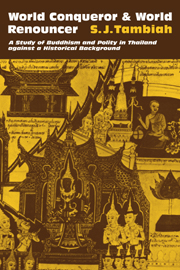 World Conqueror and World Renouncer
World Conqueror and World Renouncer Published online by Cambridge University Press: 10 November 2010
To evaluate fully the nature and degree of the sangha's legitimation of the polity today in Thailand, we must first see the polity for what it is. The revolution of 1932, its social origins and the course that it took, provides us with some paradoxes and ambiguities that provide the key to the understanding of the stock of symbols that gives meaning to politics today and which in turn is actively manipulated by those in power.
We have already noted the social origins of the promoters of the revolution. They represent the newly educated army officers and civilians of commoner status whose object was to push aside the absolute monarch and his royal princes and select nobles, and to exercise their power. Note that their constituncy was (and has been ever since) the armed services, the civil service, and members of the governmental bureaucracy (and also the professions that usually have governmental association); they have never represented in any direct sense the masses, especially the rural population. We have also already noted the second feature about the revolution: It progressively became dominated by cliques of the armed forces whose form of government from 1939 to 1944, and then again from 1950 to the present, has taken an unambiguously authoritarian character.
But the paradoxical element is that the revolution of 1932 introduced into Thai politics certain ideas that have served as political values and symbols that are periodically invoked and manifest salience even as the generals periodically violate them.
To save this book to your Kindle, first ensure no-reply@cambridge.org is added to your Approved Personal Document E-mail List under your Personal Document Settings on the Manage Your Content and Devices page of your Amazon account. Then enter the ‘name’ part of your Kindle email address below. Find out more about saving to your Kindle.
Note you can select to save to either the @free.kindle.com or @kindle.com variations. ‘@free.kindle.com’ emails are free but can only be saved to your device when it is connected to wi-fi. ‘@kindle.com’ emails can be delivered even when you are not connected to wi-fi, but note that service fees apply.
Find out more about the Kindle Personal Document Service.
To save content items to your account, please confirm that you agree to abide by our usage policies. If this is the first time you use this feature, you will be asked to authorise Cambridge Core to connect with your account. Find out more about saving content to Dropbox.
To save content items to your account, please confirm that you agree to abide by our usage policies. If this is the first time you use this feature, you will be asked to authorise Cambridge Core to connect with your account. Find out more about saving content to Google Drive.